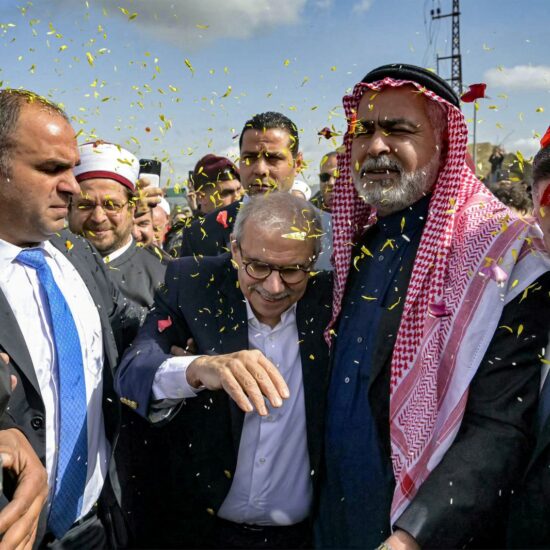
In a normal country, the arrest of a fugitive wanted on more than a thousand warrants would be a routine security update. In Lebanon, it turns into a full Hollywood production: swapped cars, hidden identities, and videos staged and broadcast on social media as if lifted from an episode of the Sopranos. But behind this comical spectacle lies a far more serious event: the fall of Nouh Zaiter is not the fall of a drug lord alone—it is the collapse of a myth Iran and Hezbollah spent decades constructing.
Anyone following the sequence of events can see that the “security operation” promoted by the authorities is nothing more than the final act of a very long drama. Despite all the immunity and protection Nouh enjoyed, the Lebanese state could have apprehended him years ago—had it truly wished to. What changed today is not state capacity but political will: the sudden, unannounced removal of the militia-political umbrella that shielded him for so long. His function had eroded; his usefulness expired—especially following the fall of the Assad regime’s role as Hezbollah’s partner in the vast Captagon empire that once generated over five billion dollars annually.
Here lies the real defeat: the downfall of an entire axis that spent years pouring money, weapons, and propaganda into manufacturing heroic illusions, only to watch them crumble at the first genuine test.
What was most absurd—and perhaps most pitiful—was the disappointment expressed by some within Nouh Zaiter’s own social environment. Many had built up an expectation that he would “stand firm” and “fight to the end,” imagining a modern-day Achilles dying gloriously in battle, not a mediocre drug trafficker meekly surrendering.
But reality is unforgiving. Nouh was never a fighter, nor a hero. He was a cowardly criminal who fled when courage was required, wrapped only in the militia protection that granted him immunity from the law. When that cover fell, he fell with it—not in a blaze of battle, but in a voluntarily filmed surrender choreographed to look like a “complex operation” rather than the humiliating end it truly was.
There were those—fed by the mythology of “heroism,” “manhood,” and “resistance”—who needed him to be a legend. Instead, they received a spectacle of disgrace.
This collective disappointment is not personal; it is political and social. It exposes the fragility of the narrative Hezbollah has woven for decades—one of “protection,” “dignity,” and “resistance”—a narrative that unraveled the moment Nouh’s knees hit the ground.
One of the most dangerous projects Hezbollah is currently undertaking is the redefinition of “the enemy” in the minds of its own base. Israel is no longer the central adversary. The real enemy, according to the party’s evolving discourse, is the Lebanese state itself.
The party insists on promoting a narrative in which any attempt to build an independent state, army, or judiciary is merely a plot to “strip the resistance of its weapons”—and thus deprive it of the “decisive” ground confrontation it imagines is coming with Israel. In Hezbollah’s telling, the looming war is inevitable, and only it can face Israel. The Lebanese state is therefore framed not as a national institution, but as an existential threat.
Through careful rhetoric and deliberate distortions, Hezbollah tries to embed a new equation in the mind of its supporters:
“The state wants to disarm us now because it knows the real battle is approaching, and only we can win it.”
With this logic, the party turns every discussion about weapons into a matter of survival, every call for sovereignty into treason, and every legal or institutional reform into an attack on “the community.”
But behind this inflated discourse lies a simpler truth: Hezbollah is acutely aware that much of its popular legitimacy has eroded. Its environment is no longer swallowing the same old excuses, and the cost of sustaining Iran’s regional project has become unbearable.
So the party is manufacturing a new conflict: a domestic one—against the army, the judiciary, and the state—rather than against Israel.
Yet this strategy carries the seeds of its own undoing. No community, no matter how loyal, will indefinitely tolerate watching its future and its children’s destinies hijacked for a “ground battle” that will never actually come.
This episode cannot be separated from the regional context. Iran today is on the defensive on multiple fronts: its influence is shrinking in Iraq, its allies in Yemen face unprecedented pressure, and its standing in Lebanon—even within core constituencies—is eroding.
The fall of Nouh Zaiter, in this almost cartoonish fashion, is a small detail within a larger picture of regional decline. An axis once boasting of “managing resistance fronts” is now unable to protect even its minor operatives—because their continued presence has become a liability, not an asset.
Handing over Nouh is a clear signal: Hezbollah is sacrificing old tools to appease the state or balance shifting regional equations.
The current confrontation—state or weapons—is the opening chapter of a new internal struggle. The party will not easily allow a campaign against drug traffickers to shift the spotlight onto its arms. It will continue portraying the state as the enemy, the army as biased, and the judiciary as a political instrument.
But the truth is clearer than ever: Lebanon cannot recover while armed groups operate outside the state, while sects are run as fiefdoms, and while the shadow economy overpowers the formal one.
Nouh Zaiter is not the core problem. He is a symptom.
The disease is the weapon outside the state, the decision made beyond the border, and the system that manipulates communities for political gain.
Some may celebrate Nouh’s surrender today, but the true moment of national joy will come only when the militia hands its weapons to the state—not when a drug lord hands himself to a camera.
Yet Nouh’s fall must not become a mere “upgrade in scenery”—a transfer from his remote village to the more comfortable heights of the Roumieh penitentiary. The real fear today is not his escape—it is his stay. The fear that his cell will become a private wing, a guarded room, a suite of privileges enabling him to continue running his network, distributing his poison, and expanding his influence from behind bars.
Justice that allows a criminal to rule from prison is not justice—it is the reproduction of the crime by other means.
Lebanon can no longer tolerate new plays staged inside old prisons, nor the existence of small militias inside a large one, nor a judiciary that distributes justice according to sectarian quotas.
Nouh’s fall must mark the beginning of an end—not the beginning of a new performance.
This article originally appeared in Elaf
Makram Rabah is the managing editor at Now Lebanon and an Assistant Professor at the American University of Beirut, Department of History. His book Conflict on Mount Lebanon: The Druze, the Maronites and Collective Memory (Edinburgh University Press) covers collective identities and the Lebanese Civil War. He tweets at @makramrabah







